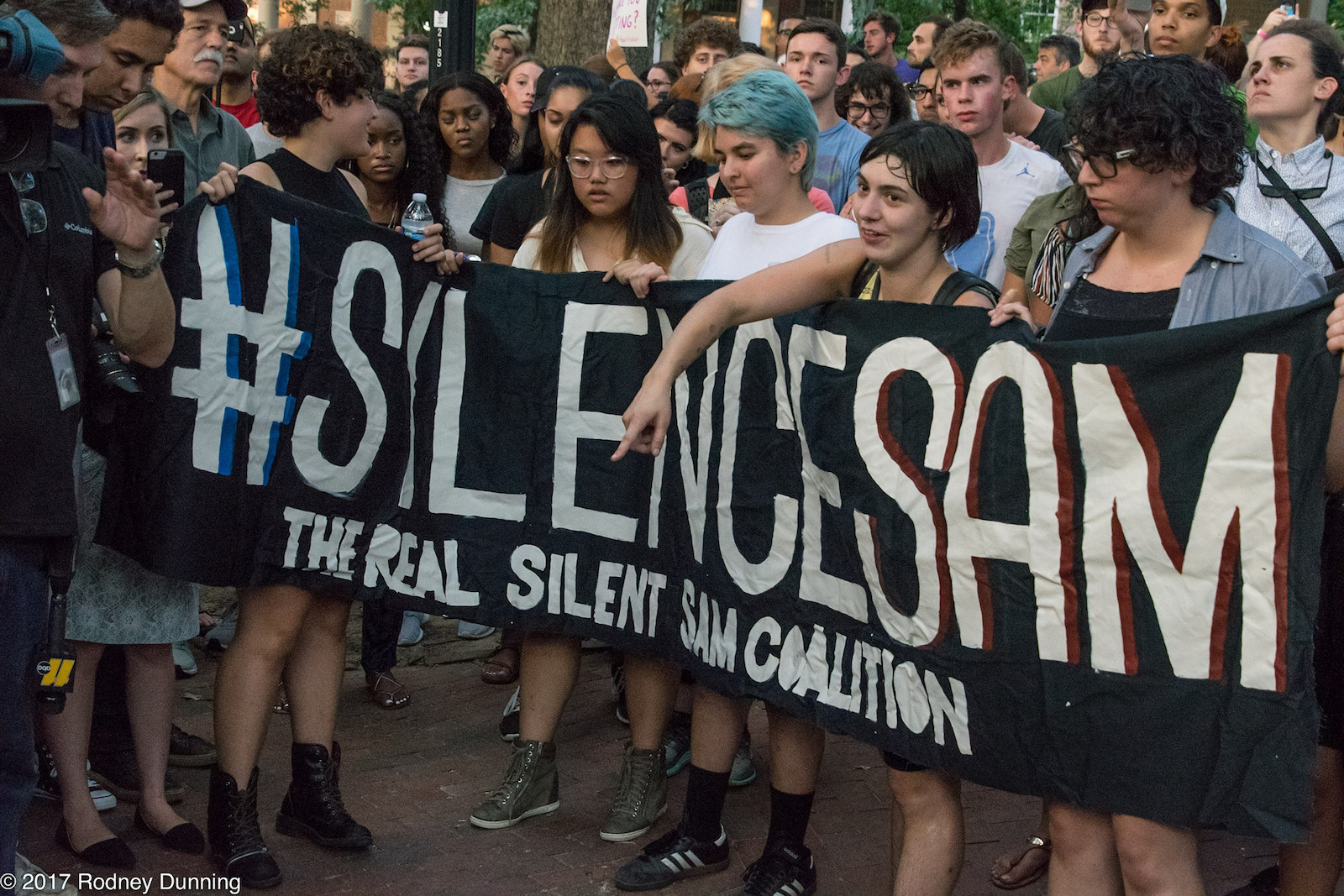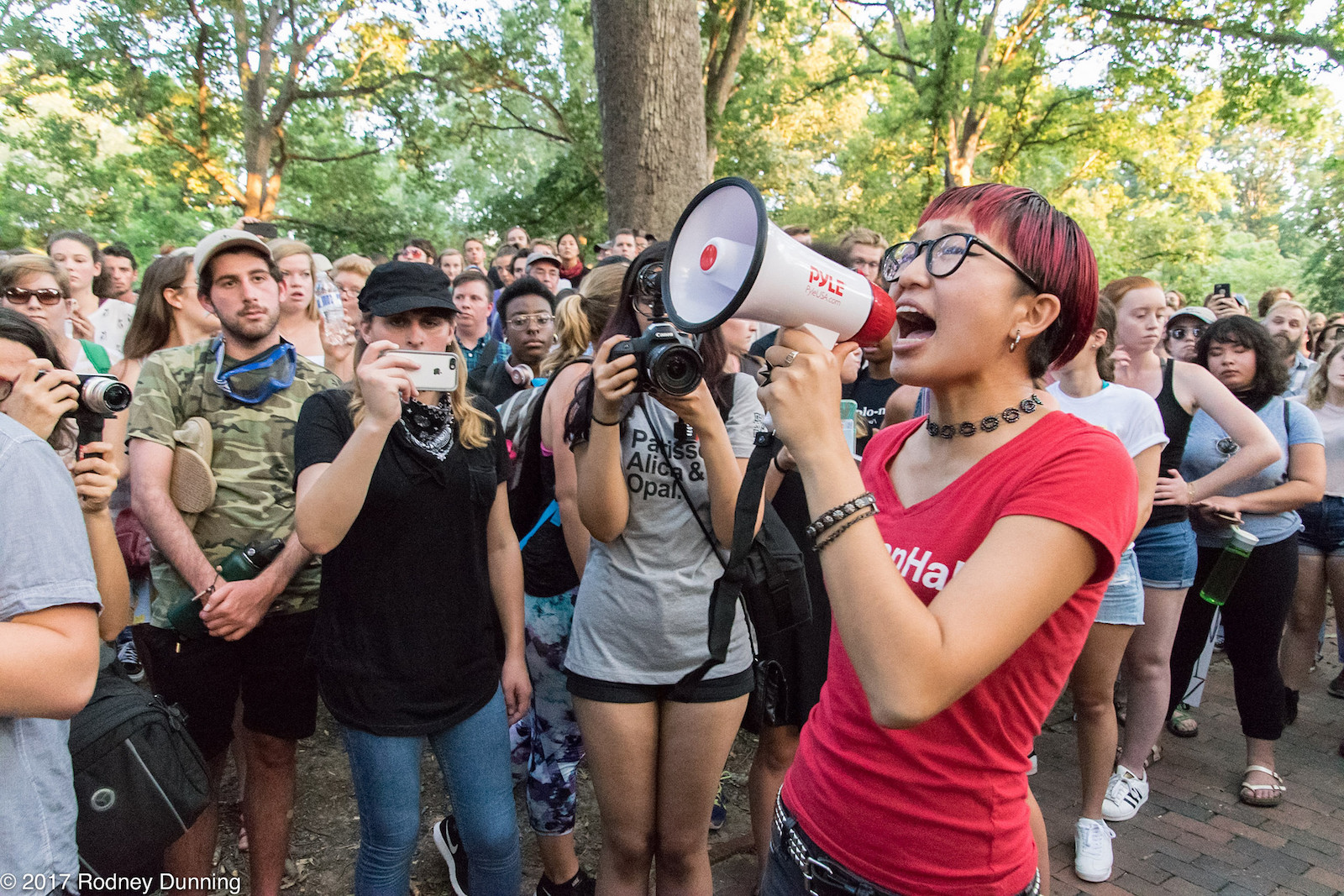UNC’s Center for the Study of the American South recognizes that we cannot lead critical conversations in or about the region if we do not address the controversies on our own campus.
We could not be more pleased that, in many ways, our statement became irrelevant as soon as we published it. We are proud of the activists and students who, in the words of Pauli Murray (a black woman who wrote to then-President Frank Porter Graham seeking admission to UNC in 1938), “cannot compromise with [their] ideals of human equality.” Like Murray, “We have seen the consequences of such compromises in the bloody pages of human history, and we must hold fast, using all of our passion and our reason.” UNC’s leadership refuses to recognize that their own inaction put our community in danger. We acknowledge the constraints they face but we urge them to stand on the right side of history and join us in rejecting simplistic interpretations of last night’s actions as vandalism. Silent Sam was violence. Protestorswho removed it sought to reorient our future toward non-violence. UNC’s leadership has another chance to heed Pauli Murray’s call to hold fast to our ideals for human equality. We need new narratives to reckon with the history we share. [Addendum: 8.21.18]
UNC’s Center for the Study of the American South recognizes that we cannot lead critical conversations in or about the region if we do not address the controversies on our own campus. As we study the South at the University of North Carolina at Chapel Hill, we are compelled to confront the fact that southerners are as hostile to one another as we are hospitable. Southerners created the Confederacy, and they also created the Civil Rights Movement. We are now in another moment when UNC’s legacy will be forged in powerful ways that reach beyond the politics of our state.
The Confederate monument at UNC nicknamed “Silent Sam” is a misogynist insult to the campus’s women; it also whitewashes the past to reflect a Jim Crow regime that we reject. Silent Sam stands in the way of every constructive, future-oriented value that UNC-Chapel Hill holds. To move forward, we will not erase the past, but we must energize the inclusive aspects of southern life that carry us forward. Inclusive southerners have borne centuries of movement and merging in this region not as a burden but as an engine to transform the world. Inclusivity is a style of leadership that is not afraid to challenge hierarchies when equal protection is at stake. “Silent Sam” stands in the way of our purpose.

Last year, when white nationalists invaded Charlottesville, Virginia, and committed murder and assault in the name of Confederate memory and white supremacy, rigorous, useful analysis ensued from the tragedy. It became clear that Silent Sam does not represent the Confederacy or the Civil War accurately. Its establishment is incendiary and represents a current of racial hatred that many who otherwise wish to honor the Confederate dead reject. Silent Sam stands for a regime that endorsed the violent subjugation and exploitation of black people. Given the many options to remove, relocate, or contextualize the statue, why would we keep it on the metaphorical mantelpiece of our home?
Chancellor Folt has called for the monument’s removal, in keeping with the wishes of the majority of the University community. A new effort to contextualize the monument has been announced. Yet the administration has spent nearly $400,000 to provide security around the statue. Those same security officers have removed student property and destroyed students’ own efforts to contextualize the monumenton McCorkle Place. Last fall’s bucolic tailgating was disrupted by angry campus visitors who confronted students with racial epithets while security officers stood by. Student Maya Little has been charged with violating UNC’s honor code.
While there is widespread support for removing the statue, our UNC leadership has focused narrowly on managing this crisis within the context of a 2015 state law that says we cannot remove the statue on our own. North Carolina’s General Assembly provides for a clear avenue to remove the statue—a petition to the Historical Commission—but when the administration has made a move to address removal, the University’s attorneys have insisted that they cannot do so. According to legal experts, they cannot file a petition or even discuss the issue, and Board of Governors Chairman Harry Smith reneged on an earlier statement that proposed openness.

The inaction that has resulted is immoral. Excessive deference to process over people can itself be a form of violence when it makes the obvious solution to end suffering seem impossible. We are not proposing that the Chancellor and others break the law. Not pursuing the legal remedy available to us, a formal petition from the University to the Historical Commission to remove the statue, is not a practical or ethical position. A recent statement by the Historical Commission, which meets August 22, implies they are waiting for such a petition to consider removing the statue. This glacial pace of problem-solving will not quiet this issue. We see that from the anniversary protests at the University of Virginia and in Washington, D.C. inaction does not protect our campus.
The Center for the Study of the American South recognizes that removing the statue will not, by itself, erase attitudes of white supremacy, eliminate racial violence in our society, provide equal protection to immigrants who enter lawfully, or redress the other injustices that are standing in the way of our nation’s progress. Removing a toxic symbol from our campus, however, will free the University of North Carolina to fulfill its promise to facilitate research, knowledge, ideas, and frameworks that do address these problems. Taking Silent Sam down opens the door for reconciliation and will allow UNC to declare itself a true home for all.

